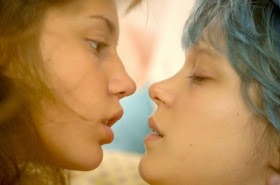The year is set to close to in a month as the Oscar film season is starting to heat up. Especially as there’s a bunch of films coming and some to arrive early next year though they’ll be in New York City and Los Angeles in late December. Of course, the holidays for me is about getting whatever Criterion DVDs I can get before the sale ends. In the meantime, I’m also doing things to get ready for the next year as I’ve officially announced my list for the 2014 Blind Spot Series which was not easy to come up with yet I have managed to pick out films that I want to see. Especially in wanting to do something that is different and challenging.
Another thing that I’m taking serious consideration into is starting another blog. This time, it will focus on the world of professional wrestling as I have a lot of things to say about the state of World Wrestling Entertainment and my feelings as a longtime fan of pro wrestling. I’m having trouble coming up with a name for the blog but it will definitely becoming as I have plans for what to do for the next year as the 30th WrestleMania is going to come next year though I’m also very worried considering the state of how WWE is doing things.
In the month of November, I saw a total of 37 films, 26 first-timers and 11 re-watches. Definitely down from last month but still pretty good as I decided to take a breather during the Thanksgiving holidays. Of course, one of the highlights of the month is my Blind Spot assignment in Sunset Boulevard yet it wasn’t the highlight as here is the top first-timers that I saw for November 2013:
1. The Apartment
2. Mystery Train
3. Blue is the Warmest Color
4. Ace in the Hole
5. Belle de Jour
6. Late Spring
7. Wreck-It-Ralph
8. Double Indemnity
9. The Perks of Being a Wildflower
10. The Hunger Games: Catching Fire
Monthly Mini-Reviews
nWo: The Revolution
I enjoyed watching the New World Order during that period of the Monday Night Wars as they were just cool bad guys running amok in World Championship Wrestling. The documentary the WWE created definitely told a pretty good story with interviews from members like Kevin Nash, Sean Waltman, and the Big Show along comments from Cody Rhodes and Booker T about its impact as well as why it fell apart when the faction split into two and how their 1999 reunion turned out to be a flop. Though there’s some parts of the doc that was skimmed over, it is still something that fans of the nWo will enjoy.
Top 10 Re-Watches:
1. Chungking Express
2. Some Like It Hot
3. The Parent Trap
4. Ray
5. Cloud Atlas
6. Year of the Horse
7. Original Gangstas
8. The Banger Sisters
9. Fools Rush In
10. Best of the Best 2
That is it for November. In December, I will be doing a few films by Yasujiro Ozu and Sergei Eisenstein where the latter will be in relation to the last Blind Spot assignment in Battleship Pontemkin. Along with films by Wong Kar-Wai to accompany the Auteurs piece on him at Cinema Axis, I will also review some new films like Nebraska, Her, The Wolf of Wall Street, and whatever is available. There will also be some more film reviews that is going to be related to subjects for next year’s Auteurs subjects where after I finish the Auteurs piece on Wong Kar-Wai and my Blind Spot. I will make a formal announcement on what filmmakers I will profile for the next year as well as some plans for 2014 as I'm also going to make my list of the Most Anticipated Films of 2014. I also hope to end the year with the first of many variation on what I think are the 100 Greatest Films ever made. Until then, this is thevoid99 signing off…
© thevoid99 2013






























